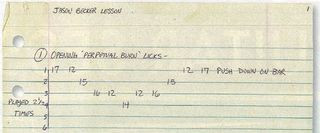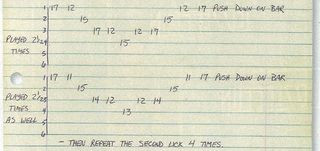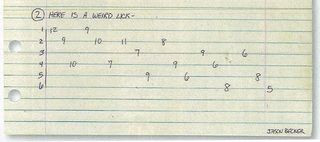It’s always humbling to see other musicians tackle your work, and I’ve been blown away by some of the covers of my song “Perpetual Burn” out there. Jeff Loomis’ version on YouTube is incredible, and Alexandra Zerner also did a really nice rendition. It’s interesting to see how other guitar players interpret and put their own spin on the song.
One thing I’ve noticed is that some players seem to find the intro licks a bit tricky. That’s understandable, and maybe it’s because I didn’t actually play them completely clean on the original recording. There’s a bit of a story behind that, and it wasn’t exactly intentional!
Back when we recorded it, the amp was feeding back quite a bit between those opening licks. Instead of having noticeable silences between each note, I instinctively started using the tremolo bar to control the feedback and smooth things out. It was a spur-of-the-moment decision born out of necessity, and it changed the feel of the intro. Sometimes limitations can actually lead to interesting creative choices.
 Jason Becker playing guitar with intense focus
Jason Becker playing guitar with intense focus
Thinking back on it, it reminds me of something Marty Friedman used to say: “A craftsman never blames his tools.” It’s so true. As musicians, we have to adapt and find solutions, whatever the situation. There are always going to be technical challenges, whether it’s amp feedback or anything else, but those shouldn’t be excuses for not pushing ourselves and creating great music.
Speaking of pushing ourselves, I often hear players making excuses for why they feel they aren’t progressing or “kicking ass” on the guitar. Sometimes, the reality is simply that more practice is needed. It’s about putting in the hours and striving to sound good on any guitar and amp you pick up. Mastering your instrument is key, regardless of the gear.
Let’s break down those intro arpeggios a little. The first one is actually based on a pentatonic scale, just with a couple of notes removed – the high G and the lower A. It’s a familiar shape, but taking those notes out gives it a slightly different flavor.
 Jason Becker demonstrating guitar technique
Jason Becker demonstrating guitar technique
The second arpeggio is very similar, using the same shape, but with a slight change. Every B note is changed to a C. It’s a small tweak, but it creates a different harmonic movement. It’s a pretty compact and efficient shape for your fingers to navigate once you get it under your hand.
The third arpeggio is a bit different. It’s just a sequence of notes that, at the time, simply sounded good to my ears. I was really into exploring unusual note choices back then, things that might catch the listener off guard and add a bit of surprise or tension. Experimenting with those “weird” notes became a part of my style.
Arpeggios have become such a fundamental part of my playing and composing. Why do I like them so much? Well, initially, it was because I was good at playing them! But beyond that, I realized they are incredibly versatile. They contain so many musical elements within themselves. You can find the chords, the melody, and even the rhythm all implied within a single arpeggio line. They’ve really become ingrained in my overall sound and approach to guitar.
 Close-up of Jason Becker's hands on a guitar fretboard
Close-up of Jason Becker's hands on a guitar fretboard
It’s funny, I sometimes jokingly criticize myself for not playing that intro perfectly cleanly. But honestly, it doesn’t really bother me. So many guitar players spend countless hours striving for absolute clinical precision and cleanliness in their playing. While playing clean is definitely a valuable skill and something to aim for, especially for developing technique, it’s not the only thing that matters. Capturing a vibe, conveying attitude, and injecting personality into your playing are arguably even more important.
Think about someone like Jimmy Page. Imagine if he had obsessed over nailing every single note perfectly, rather than focusing on that raw, creative spontaneity and energy that defined his playing. He wouldn’t be the iconic Jimmy Page that we all admire. His “imperfections” are part of what makes his style so unique and captivating.
However, it’s also important to recognize that we’re not all Jimmy Page! There’s a trend I see sometimes where players use sloppiness as a style, almost as a badge of honor, without really having the musicality or magic to back it up. It’s not enough to just be sloppy and call it “vibe.”
Ultimately, it’s about finding a balance. It’s not always just about “practice, practice, practice,” but it’s also not solely about thinking your personality is more important than the actual music you’re creating. A good mix of focused practice and letting your musical personality shine through is the sweet spot.
If you’re curious to hear how the “Perpetual Burn” intro was originally intended, played cleaner and closer to my initial idea, you can check out the demo version. It’s on my CD “The Blackberry Jams,” and it’s near the end of the song. It offers a different perspective on that intro and the evolution of the track.

